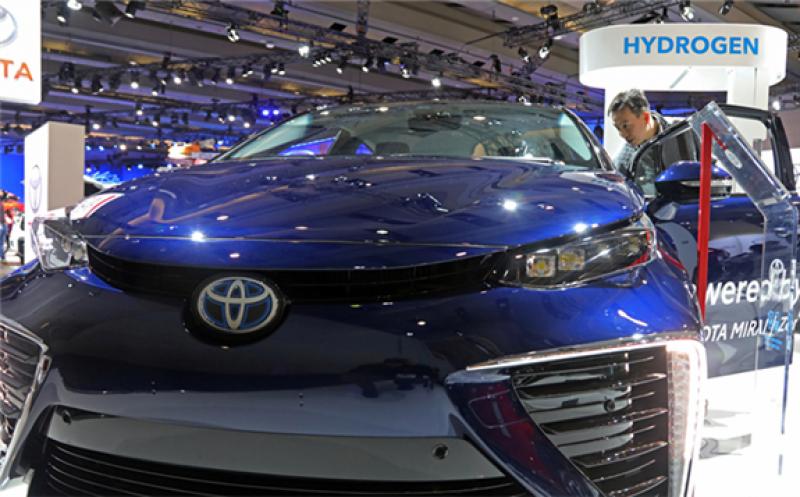Eighty-eight Japanese companies including Toyota Motor and the country's three mega banks joined the Japan Hydrogen Association that was set up on Monday to encourage the wider use of hydrogen by establishing a fund and supporting new projects.
 Toyota is expected to launch a new model of a hydrogen-fueled car, Mirai, within the month. © Reuters
Toyota is expected to launch a new model of a hydrogen-fueled car, Mirai, within the month. © Reuters
Members of the association, shortened as JH2A, include hydrogen supplier Iwatani and Japan's biggest banks -- Sumitomo Mitsui Financial Group, Mizuho Financial Group and Mitsubishi UFJ Financial Group.
The JH2A aims to address problems around the use of hydrogen, including high costs, the lack of demand and need for investments. Japan has set a target to achieve net-zero greenhouse gas emissions by 2050.
Hydrogen is seen as essential in helping Japan reach this goal, because it does not emit carbon dioxide when burned. It could also be used in sectors that has been difficult to electrify with renewable energy, such as mass steel production.
"To realize a hydrogen society, there needs to be vast and various types of capital," such as for infrastructure development, and research and development, said SMBC Chairman Takeshi Kunibe at a launch event on Monday.
He suggested that there should be discussions to create a new system of indirect finance backed by the government, or a scheme to attract green investments from institutional investors. The JH2A plans to set up and manage a new fund.
In addition, the association will lobby for regulatory changes. Toyota Chairman Takeshi Uchiyamada said that as regulatory hurdles in Japan are higher than in other countries, he would "discuss with various stakeholders in the production, logistics and uses of hydrogen, and partner with related bodies to submit proposals to the government."
Even as Toyota prepares to launch a new model of a hydrogen-fueled car, Mirai, within this month, it faces high costs in building charging stations, as well as for the car itself and the hydrogen.
Iwatani Chairman Akiji Makino suggested that costs could be lower if requirements for the materials used for hydrogen stations could be lowered to the level in Germany.
Makino said that demands for hydrogen should also come from sectors other than cars, such as for ships and power generation.
Japan's Minister of Economy, Trade and Industry Hiroshi Kajiyama said at the event "to see hydrogen as a new energy source and to accelerate social implementation is now the most important thing." He also said that Japan needs to continue to take world leadership in this area.
The Japanese government announced its hydrogen strategy relatively early in 2017, but other governments such as Germany and the European Union announced ambitious strategies this year to sped up efforts to use hydrogen.
Kajiyama added that introducing subsidies, tax incentives and deregulations for hydrogen development would be included in the government's "Green Growth" strategy which is expected to be announced this month.